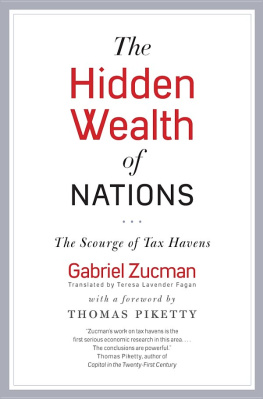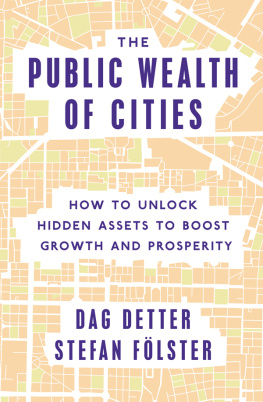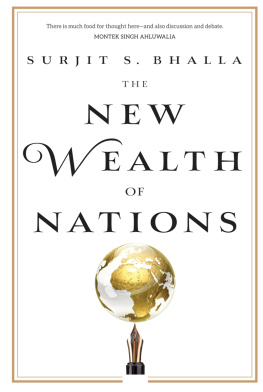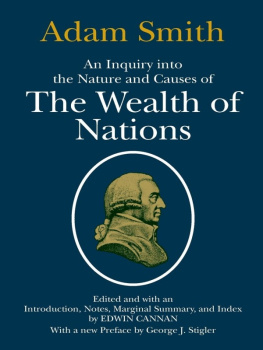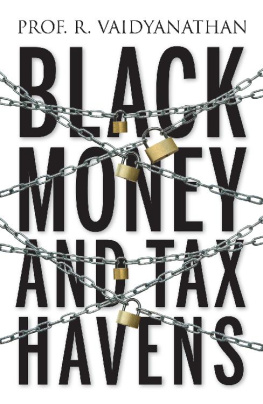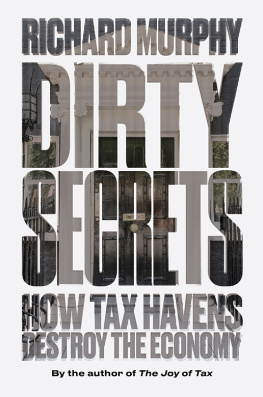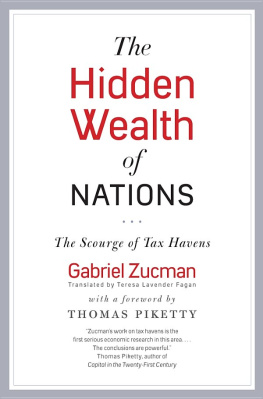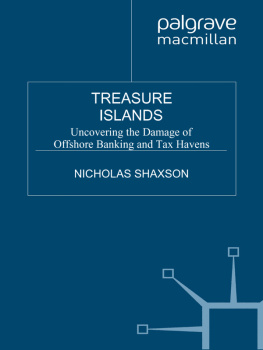The Hidden Wealth of Nations
The Scourge of Tax Havens
Gabriel Zucman
Translated by Teresa Lavender Fagan
With a Foreword by Thomas Piketty
The University of Chicago Press
Chicago and London
GABRIEL ZUCMAN is assistant professor at the London school of economics.
The University of Chicago Press, Chicago 60637
The University of Chicago Press, Ltd., London
2015 by The University of Chicago
Foreword 2015 by Thomas Piketty
All rights reserved. Published 2015.
Printed in the United States of America
24 23 22 21 20 19 18 17 16 15 1 2 3 4 5
ISBN-13: 978-0-226-24542-3 (cloth)
ISBN-13: 978-0-226-24556-0 (e-book)
DOI: 10.7208/chicago/9780226245560.001.0001
Originally published as La richesse cache des nations: Enqute sur les paradis fiscaux Editions du Seuil et la Rpublique des Ides, 2013
Library of Congress Cataloging-in-Publication Data
Zucman, Gabriel, author.
[Richesse cache des nations. English]
The hidden wealth of nations: the scourge of tax havens / Gabriel Zucman; translated by Teresa Lavender Fagan; with a foreword by Thomas Piketty.
pages; cm
Includes bibliographical references and index.
ISBN 978-0-226-24542-3 (cloth: alk. paper) ISBN 978-0-226-24556-0 (e-book) 1. Tax havens. 2. Tax evasion. I. Fagan, Teresa Lavender, translator. II. Piketty, Thomas, 1971, writer of foreword. III. Title.
HJ2336.Z8313 2015
336.24'16dc23
2015019946
This paper meets the requirements of ANSI/NISO Z39.48-1992 (Permanence of Paper).
Contents
Thomas Piketty
If you are interested in inequality, global justice, and the future of democracy, then you should definitely read this book. The Hidden Wealth of Nations by Gabriel Zucman is probably the best book that has ever been written on tax havens and what we can do about them. It is nontechnical and lively, and it achieves three different goals in a very concise and efficient manner.
First, it provides a fascinating history of tax havens: how they came into existence in the interwar period, and how they gradually acquired the prominent role that they have today. Next, it offers the most extensive and rigorous quantitative evaluation ever proposed of the global financial significance of tax havens in todays world economy. Finally, and most important, it sets a precise and realistic course of action for change, which has at its core the creation of a worldwide register of financial wealth recording who owns what in stocks and bonds.
Tax havens with their financial opacity are one of the key driving forces behind rising wealth inequality, as well as a major threat to our democratic societies. Why is this so? Quite simply because modern democracies are based on a fundamental social contract: everybody has to pay taxes on a fair and transparent basis, so as to finance access to a number of public goods and services. Of course, there is ample room for disagreement about what fair and transparent taxation means. But if some of the wealthiest individuals and some of our largest corporations use tax havens and fiscal dissimulation in such a way that they avoid paying taxes almost entirely, then it is our basic social contract that is at stake. If middle-class taxpayers feel that they are paying higher effective tax rates than those at the top of the pyramid, if small and medium-size businesses feel that they are paying more than our largest companies, then there is a serious risk that the very notion of fiscal consentwhich is at the core of modern democracieswill fall apart altogether. And if a rising fraction of the population, at the bottom and in the middle of the pyramid, feels that the system is not working for them, and that they are not being well treated by the global economy or by their government, then many might reject the very notion of interclass solidarity and of a fair fiscal and social state. Some might become tempted by nationalist solutions, ethnic divisions, and the politics of hatred.
But what makes Zucmans book so important is that it is not only about abstract principles and dangerous threats: it is about data and solutions. There are systematic inconsistencies in international financial statistics. In particular, there are always more liabilities than financial assets reported by the worlds financial centers. By analyzing these statistical anomalies in a systematic and innovative manner, Zucman offers one of the most credible evaluations to date of the global importance of tax havens. According to his benchmark estimate, which should be viewed as a lower bound, around 8% of the worlds financial wealth is held in tax havens. In developing and emerging countries, this percentage can be much higher, which makes it even more difficult to build fiscal consent and trust in government and to address situations of extreme inequality. In Africa the share of financial wealth that is held offshore is estimated by Zucman to be around 30%. In Russia and the oil-rich countries of the Middle East (probably the most unequal and explosive region of the entire world), the share of offshore financial wealth appears to be above 50%.
In the United States, the share of offshore wealth certainly seems to be much less than in Africa or in Russia. Offshore personal wealth also appears to play a smaller role in the United States than in European countries, which have been particularly bad at coordinating their policies to fight tax havens. For instance, they had to wait for the US FATCA legislation and the US sanctions against Swiss banks in order to start moving in the direction of automatic information transmission.
It would be a mistake, however, to underestimate the importance of tax havens for the US fiscal system. According to Zucmans conservative estimates, eliminating the US tax revenue losses due to tax havens would be equivalent to an average tax increase of about 20% for all taxpayers within the top 0.1% income group. Also, while the United States may have less of an issue than Europe with offshore personal wealth, they have a bigger problem with corporate tax evasion by multinational companies. Finally, and most important, Zucman warns us that the FATCA legislation still has a lot of holes in it and that the overall importance of tax havens has continued to rise between 2008 and 2015. We might need much larger sanctions than those that have been implemented so far in order to make real progress. For instance, according to Zucmans computations, the benefits that a country like Switzerland gains from financial opacity are equivalent to the losses that it would suffer from a 30% trade tariff imposed by its three biggest neighbors (Germany, France, and Italy). Of course, we might choose not to apply these sanctionsbut then we should not complain when the problem gets bigger and bigger. Global financial opacity is a major challenge for all countries, and there is still a long way to go before we can curb these structural trends.
According to Zucman, the key step should be the creation of a worldwide register of financial wealth, recording who owns what in stocks and bonds. This global financial register would act as a central depository: it would be coordinated by governments and international organizations, allowing national tax administrations to fight tax evasion and to levy taxes on capital-income flows and wealth stocks.
Some might consider the very idea of a central depository as utopian. But it is not. In fact, central depositories for global securities already exist. The problem is that these central depositories are not truly global (they are national or sometimes regional), and most important they are private, not public. Starting in the 1950s and 1960s, securities were gradually dematerialized, and paper titles soon disappeared entirely. This is when modern central depositories were created, simply because there was a need to secure financial transactions and to keep track of who owns what in a computer database (it is difficult to do business if several financial institutions or economic agents in the world claim property rights over the same asset). A number of private financial institutions developed in order to provide this service. The most well-known central depositories are the Depository Trust Company (DTC) in the United States, and Euroclear and Clearstream in Europe. The problem is that these private institutions do not exchange information with governments and tax administrations on a systematic basis. Sometimes they even tend to exacerbate and to benefit from tax evasion and financial opacity (see, for example, the Clearstream scandal in France) rather than to promote transparency.

